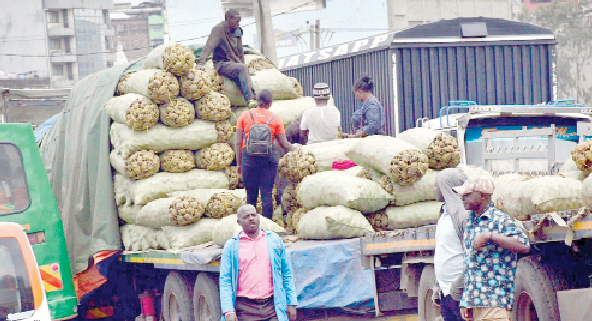Help farmers ensure food security, stakeholders told

Stakeholders have been challenged to empower smallholder farmers through education, financial support and access to sustainable agricultural technologies to boost food production. The push comes at a time when concerns of food insecurity both locally and globally continue to rise.
Recent statistics indicate that smallholder farmers, who manage less than five hectares of land, constitute about 500 million farms globally and produce up to 80 per cent of the food consumed in large parts of the developing world. Adams Amenya, Commercial Director Africa at Sistema.bio, said the surging global population has been triggering demand for food increment thereby placing unprecedented strain on agricultural systems.
Consequently, he said, smallholder farmers who are crucial custodians of soil health and, by extension, global food security should be economically and technologically empowered to meet the rising food demand.
He called on governments, non-governmental organisations, and international bodies to collaborate in providing the necessary infrastructure and support systems that enable smallholders to practice and sustain soil regeneration methods effectively.“These farmers are uniquely positioned to lead the charge in soil regeneration for several reasons,” Amenya stated. Firstly, he said, smallholder farmers often possess intricate knowledge of their local ecosystems, honed over generations.
This knowledge includes understanding the nuances of soil types, local climate conditions, and crop requirements, enabling them to implement effective soil management practices.
Secondly, smallholder farmers tend to utilise diversified farming systems that are less reliant on synthetic inputs, reducing the risk of soil degradation. “Their reliance on organic methods, such as composting and intercropping, naturally supports soil regeneration,” said Amenya.
Innovative solutions
He rooted for adoption of best farming practices, innovative solutions, and successful case studies that can inspire and educate the farmers besides fostering global dialogues about soil health, sustainable agriculture, and food security.
This, he said, will lead to more cohesive and effective policies and actions.
“Let us recommit to supporting these farmers and promoting soil regeneration practices. By doing so, we can ensure the health of our soils, the sustainability of our food systems, and the resilience of our planet for future generations,” he Amenya added. “This is an opportune moment to reflect on our environmental stewardship and to restrategise our efforts to protect and restore the planet.” Sistema.bio, a leading biogas technology provider has been leading a movement to restore the land to its former glory through soil regeneration. Soil, often referred to as the planet’s skin, plays an integral role in water filtration, carbon sequestration, and nutrient cycling.
“Healthy soil supports robust crop growth, which is essential for food production. However, decades of intensive farming, deforestation, and industrial pollution have severely degraded soils worldwide, leading to reduced fertility, increased erosion, and the loss of vital soil organisms,” noted Amenya. He said that soil regeneration stands at the forefront of sustainable agricultural practices, representing not just an ecological necessity but a fundamental component of human survival.
Amenya called on stakeholders to facilitate farmers’ unlimited access to resources, markets and technological innovations for increased productivity.



